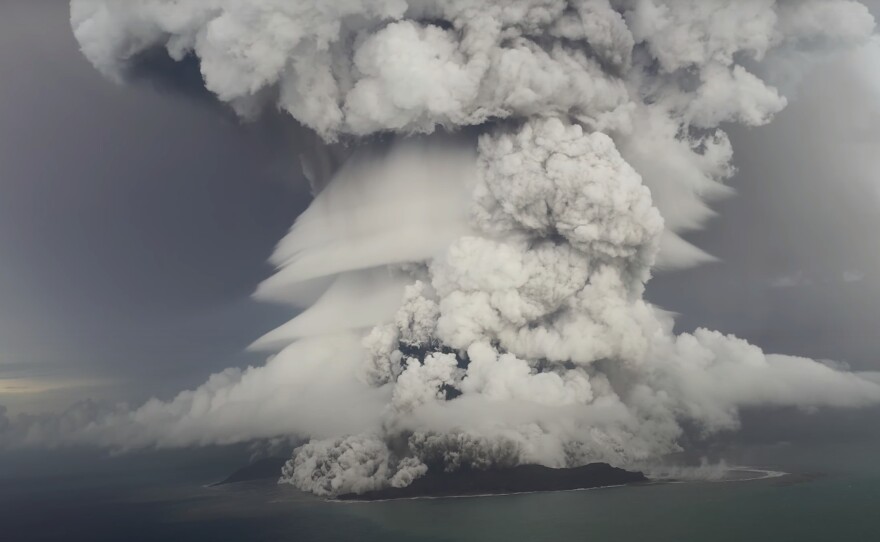The violent eruption of Tonga's Hunga Tonga-Hunga Ha'apai volcano injected an unprecedented amount of water directly into the stratosphere — and the vapor will stay there for years, likely affecting the Earth's climate patterns, NASA scientists say.
The massive amount of water vapor is roughly 10% of the normal amount of vapor found in the stratosphere, equaling more than 58,000 Olympic-size swimming pools.
"We've never seen anything like it," said atmospheric scientist Luis Millán, who works at NASA's Jet Propulsion Laboratory. Millán led a study of the water the volcano sent into the sky; the team's research was published in Geophysical Research Letters.
The volcano sent vapor and gases to a record height
The Jan. 15 eruption came from a volcano that's more than 12 miles wide, with a caldera sitting roughly 500 feet below sea level. One day earlier, Tongan officials reported the volcano was in a continuous eruption, sending a 3-mile-wide plume of steam and ash into the sky. Then the big blast came, sending ash, gases and vapor as high as 35 miles — a record in the satellite era — into the atmosphere.

Drone aircraft and other video from that day show the dramatic scale of the blast, as the volcano launched an incredibly wide plume into the sky. The intense eruption sent a pressure wave circling around the Earth and caused a sonic boom heard as far away as Alaska.
The huge amount of water will likely raise temperatures
Earlier large volcanic eruptions have affected climate, but they usually cool temperatures, because they send light-scattering aerosols into the stratosphere. Those aerosols act as a sort of massive layer of sunscreen. But since water vapor traps heat, the Tongan eruption could temporarily raise temperatures a bit, the researchers said.
It normally takes around 2-3 years for sulfate aerosols from volcanoes to fall out of the stratosphere. But the water from the Jan. 15 eruption could take 5-10 years to fully dissipate.
Given that timeframe and the extraordinary amount of water involved, Hunga Tonga-Hunga Ha'apai "may be the first volcanic eruption observed to impact climate not through surface cooling caused by volcanic sulfate aerosols, but rather through surface warming," the researchers said in their paper.
NASA says the data for the study came from the Microwave Limb Sounder (MLS) instrument on its Aura satellite, which measures water vapor, ozone, aerosols and gases in Earth's atmosphere.
The volcano interrupted the 'heartbeat' of water in the stratosphere
The Jan. 15 eruption emphatically disrupted annual water patterns in the stratosphere (which also holds most of the atmosphere's ozone).
The normal mechanism by which water rises into the stratosphere is so reliable that researchers refer to it as a sort of tape recorder, marking annual temperature cycles through alternating bands of dry and moist air rising from the tropics.
January is normally the middle of the dry period in that seasonal cycle — but then the Tongan volcano erupted in the South Pacific Ocean, suddenly injecting a huge amount of water high in the atmosphere.
"By short-circuiting the pathway through the cold point, [Hunga Tonga-Hunga Ha'apai] has disrupted this 'heartbeat' signal" in the planet's normal atmospheric water pattern, the researchers said.
They recommend closely monitoring the water from the volcanic eruption, both to predict its impact in the near term and to better understand how future eruptions might affect the planet's climate.
Copyright 2022 NPR. To see more, visit https://www.npr.org. 9(MDAzMjM2NDYzMDEyMzc1Njk5NjAxNzY3OQ001))






